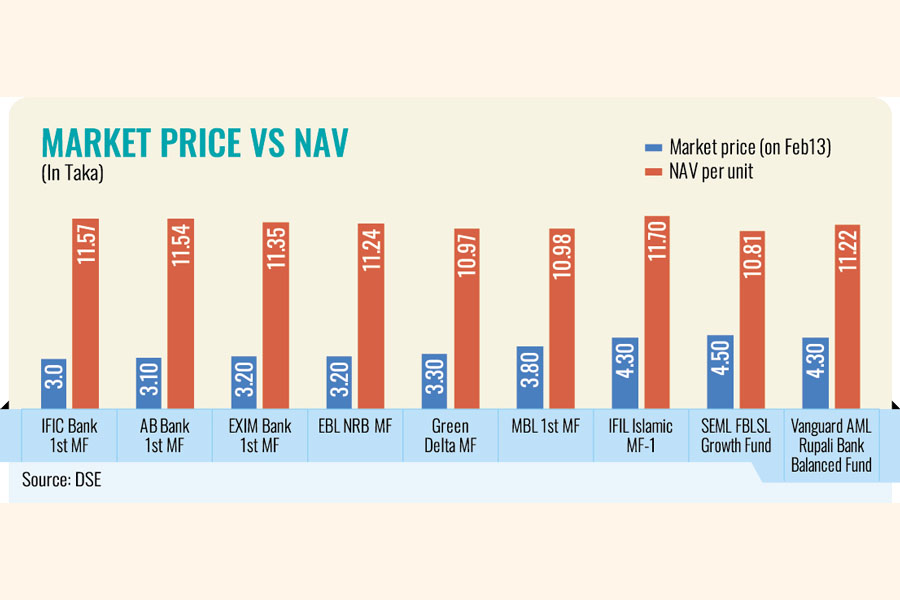Heavily-discounted mutual funds don't get buyers. Here is why

Published :
Updated :

Presently, one can purchase mutual fund units at only Tk 3 each when net asset value per unit is more than Tk 11.
That means investors will get a heavy discount of 72 per cent for investing in an instrument vehicle of the kind but still the market shows a clear lack of interest.
A major reason is widespread skepticism about the asset value claimed by fund managers and the quality of underlying assets.
Many fund managers purchased placement shares of non-listed companies at high prices in breach of rules. The financial statements of the funds managed by those unscrupulous asset managers do not reflect the real values of the assets in the portfolios.
Moreover, scams committed by several fund managers have tarnished investors' confidence in the pooled funds.
The unexpected extension of the tenure of close-ended mutual funds by the securities commission led by Prof M Khairul Hossain also brought on irrecoverable damage to the sector.
The 10-year extension was done on the pretext of averting the negative impacts of liquidation on the market in the aftermath of the 2010-11 market debacle. On the other hand investors could not redeem their money 10 years after their investment but they had to continue paying management fees to fund managers.
Not only local investors, foreign investors with investments in mutual funds in Bangladesh also lost trust in such instruments following the extension.
The market has had ups and downs and so fund managers have not provided dividends regularly to unitholders.
For example, a majority of listed MFs, including the ones managed by RACE Asset Management did not distribute dividends in FY24.
So, even if the extension went in favour of fund managers, which earned management fees for an extended period, investors felt deceived and began shunning "professionally-managed" funds.
The securities regulator is also blamed for issuing licences to so many asset management companies (AMCs), without any scrutiny of their capacity and professional integrity.
Globally, pooled funds managed by professionals are popular among general investors as they ensure higher returns. The sector has been flourishing in neighbouring India, with total assets under management crossing Rs 54 trillion, higher than the GDP (gross domestic product) of Bangladesh. There the number of AMCs is 44 whereas Bangladesh has 67 AMCs with assets worth Tk 164 billion under their management as of January 4 this year.
Political influence was a major factor behind the issuance of licences to unworthy AMCs.
The securities regulator now cannot make asset managers accountable for their fraudulent activities as they get into lengthy legal battles to avoid regulatory actions.
The chief executive officer of a leading brokerage firm, preferring anonymity, said there is an AMC whose expenditure on its legal team is higher than that of the research team.
The tenure of all but three close-ended MFs will end in between 2028 and 2033 following the extension of their maturity period.
In a statement issued in October 2019 City of London Investment Management Company (CLIMC) said unitholders own the assets of the funds. "Assets do not belong to the mutual fund management companies or the BSEC [Bangladesh Securities and Exchange Commission]."
The CLIMC then filed a writ petition with the High Court, challenging the extension of the close-ended funds.
However, the court rejected the petition.
"Wrongdoers have been manipulating the system and getting away easily without any punishment," said Asif Khan, chairman of EDGE Asset Management.
The industry will not flourish until it is disciplined in the interest of unitholders, he added.
Meanwhile, investors have to wait for years to get their money back. They will not be able to realise any capital gain if they sell off their holdings in the secondary market.
The sufferings of the existing investors keep fresh investments and new investors at bay.
mufazzal.fe@gmail.com


 For all latest news, follow The Financial Express Google News channel.
For all latest news, follow The Financial Express Google News channel.